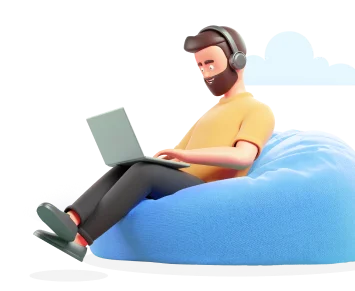
This may come as a surprise to many, but working from home can actually cause trouble sleeping. Therefore, you might ask, “Is there a connection between working from home and sleep quality?”
Numerous studies trying to establish the connection between remote work and sleep habits link the lack of sleep to various stressors associated with working from home.
According to scientists, you should get seven to eight hours of sleep every night. However, almost 40 percent of remote workers reported getting only around six hours of sleep each night.
That’s not all. Not only do remote workers lack enough sleep, but the majority of them also reported that their sleeping pattern had been disrupted, leading to poor quality of sleep. If you’re wondering how freelance work affects sleep, join us as we explore the connection and how to overcome associated problems.
How Does Remote Work Affect Sleep?
Getting enough sleep is extremely important not only for our health and well-being but also for our productivity at work. You see, when you sleep, your body is in self-repair mode – it helps prepare you for the next day. When you get a good night’s sleep, you wake up feeling refreshed, rejuvenated, and ready to take on the day’s tasks.
This level of concentration and energy helps to keep your mind sharp at work, thereby improving your performance and productivity. Getting sufficient sleep lowers the risk of chronic conditions like heart disease, diabetes, obesity, and stroke and helps to prevent other health issues like forgetfulness, immune system problems, and unwanted weight loss.
So, does remote work affect your sleep? If it interferes with your sleep pattern, then yes, it certainly does, and when your sleeping habits get disrupted due to work, you start to lose focus and you’re more likely to make poor judgments and bad decisions. This will reflect in your work, and your employers or clients are likely to notice it.
So, here are a few factors that may affect your sleep when working from home:
1. Stress
While freelancing is a dream job for many, it has become very competitive. This has forced some freelancers to agree to very tight deadlines, and they end up burning the midnight oil, trying to complete projects for fear of losing their jobs.
The pressure to meet expectations and beat deadlines can lead to work-related stress and subsequently affect the quality of sleep.
Another stressor is job insecurity. Remote workers may find themselves in situations where they don’t know where the next job will come from or when.
2. Over-Dedication to Work
Due to the competitive nature of the freelance market, remote workers spend a lot of time polishing projects to deliver near-perfect work and avoid upsetting their employers.
Studies have also shown that freelancers are very dedicated to their work. Most of them leave their phones by their bedsides so that they can jump to an opportunity as soon as it arises.
3. Trouble Setting Work-Life Boundaries
For many, finding the balance between work and personal life proves to be difficult. If you work in an office, it’s likely that you leave work in the office and pick up where you left off the next day. However, if you’re working from home, the boundary between work and home is delicate, and you may find that you work after hours. As a result, your normal sleep pattern gets disrupted.
Take the life of working parents for example. Working from home enables them to pick their kids from school, take them for ice cream or movies, and generally spend more time with them. However, the downside is that they have to make up for the lost time by working late into the night, and as a result, their sleep is affected.
4. Isolation
Unlike in an office environment where you can easily interact with co-workers, remote workers have to deal with isolation and loneliness.
Social isolation and too much loneliness are known stressors and can lead to loss of sleep, which is associated with increased risk of diabetes, dementia, and heart disease.
Many remote workers turn to social media to fight loneliness, and this is also a warning sign since studies show that spending too much time on social media can be detrimental to your sleep and overall well-being.
5. Constant Exposure to Technology
Working from home means that most of your days are spent in front of a computer screen and you are exposed to technology for extended periods. Staring at your screen for long hours each day can have serious effects on your sleep pattern.
6. Poor Posture
A good number of remote workers work from their beds or couches. While it may feel comfortable, it’s one of the leading causes of back, neck, and shoulder pain. If you keep up with this style of working, the pain may become unbearable and may eventually affect your sleep. To prevent pain from poor posture, it’s advisable to set up a proper workspace.
7. Eating Junk
The phrase “Time is money” is literally what drives freelancers to be more efficient. However, it also creates another problem – eating junk food. You see, with tight deadlines and projects halfway done, the time to prepare a healthy meal is rarely available. The next best thing is to fill up on junk foods and snacks.
Additionally, freelancers may find themselves taking lots of caffeine as they struggle to keep their eyes open throughout the night.
The thing is, when your quality of work starts to deteriorate, your employers or clients may start blaming your lack of motivation, bad decision making, or lack of experience, while in the real sense, the reason could be as simple as sleep deprivation.
Having looked at how freelance work affects sleep, it’s important to look at ways to reclaim a good night’s sleep and improve your health and performance.
How to Safeguard Your Sleep When Working from Home
When working from home, you have the freedom to wake up at any time. And with things like getting ready for work and commuting out of the picture, you can take advantage of the extra time to get additional hours of sleep. The tips below should help you get quality sleep every night and perform better at your work.
1. Develop and Maintain a Daily Routine
Your circadian rhythm plays an important role in regulating your sleep-wake cycle. When you develop a daily routine from the time you wake up to the time you retire to bed, you’ll help regulate your body’s circadian rhythm.
As a remote worker, you should stick to regular habits to know when to start working and when it’s time to “shut down the office”. While a daily schedule might not work every day, try to maintain the same consistency of waking up and start working at the same time each day. And when it’s time to close shop, do it regardless of the pending work unless it’s urgently required by your client or employer.
Take advantage of the time you would have spent commuting to go for morning runs, meditate, or do anything that makes you feel ready to start the day.
Remember to take the much-needed coffee or lunch breaks and exercise regularly to get a good stretch and get the blood flowing. If you can, take a walk or engage in your favorite activity for around 15 minutes before you get back to work.
2. Reduce Exposure to Electronics
Staring at your computer or smartphone screen for hours at a time exposes you to blue light, which is said to penetrate deep into your retina, damaging the light-sensitive cells. Since most remote workers get exposed to blue light throughout the day and at night, their sleep patterns are affected.
To minimize exposure to blue light, consider wearing blue-light-blocking glasses or installing apps that filter blue light at night.
3. Set Up a Workspace

How often do you pull your laptop into bed and get right to work? This is a common habit for most remote workers. If you work from home most of the time, we recommend setting up a workspace outside of your bedroom. This will prevent you from working from your bed or couch. In turn, you no longer have to suffer from chronic back, neck, or shoulder pain caused by poor posture.
Similarly, when you create a permanent workspace in your house, your brain will associate that space with work. Let your bedroom serve its main purpose, which is to rest and sleep without distractions.
The good thing is that you don’t need to spend a lot to set up a home office. A simple but comfortable chair and table will suffice.
4. Set Clear Work-Life Boundaries
One of the major problems facing remote workers is how to establish a work-life balance. Since work is always there with you, you might find it difficult to step away from your workspace or home office.
This may lead to overworking, which can be counterproductive. As such, you might find yourself dozing off during the daytime or having trouble waking up in the morning.
We understand how important your job is, but sticking to your work hours will allow you to drop everything when your workday comes to an end. Set a specific time when to check and respond to emails within the working hours and avoid carrying your laptop to bed. Alternatively, use autoreply to notify clients and co-workers that you’ll reply to emails sent overnight in the morning.
Besides giving yourself regular breaks during your working hours, use the “Do Not Disturb” feature on your phone to ensure that your work does not interrupt your resting hours.
5. Remember That Lighting Matters
If possible, set up your workspace in a brightly lit area of the house. Draw the curtains and blinds to let in as much natural light as possible. Research shows that absorbing plenty of natural light during the day boosts your ability to sleep better at night.
6. Eat Healthy
Did you know that diet plays a huge role in how you sleep? But with all kinds of snacks within easy reach when working from home, it takes effort not to give in to that temptation. The best approach is to stock your fridge with only healthy foods.
Don’t skip or postpone breakfast when you wake up. Indulge in high-protein lunch and eat a light, low-fat dinner at least three hours before bedtime. Eating large meals just before bed puts your digestive system to work, and this might disrupt the early stages of sleep and therefore prevent you from getting quality sleep.
On the same note, if you drink, do so responsibly. Whether it’s alcohol or caffeine, stimulants and depressants inhibit the production of melatonin (the sleep-inducing hormone) in the brain, which is likely to cause restless nights.
7. Socialize as Much as You Can
Remote work can leave you feeling disconnected and alone. When you combine this state with the isolation that comes with the job, you might start having trouble sleeping. Even in the current state of the world, with orders to stay indoors and maintain social distancing, families are still staying in touch via video calls.
With so many video conferencing apps today, you can stay in touch with friends and family without meeting them physically. And while it’s not the same feeling, at least connecting with friends and family and talking about personal or work stuff and laughing together is better than not talking to anyone for several days.
In Conclusion
After reading the information above, you must agree that there is a connection between working from home and sleep quality. And while there is no one-size-fits-all approach to practicing good sleep habits, it’s up to you to experiment with different routines and find the one that works best for you.
The “Time is money” concept is not such a bad thing, but to ensure that you’re productive every single day, we recommend that you use a time tracking app like Traqq. This program monitors your working hours and will alert you when it’s time to take a break from work. This way, you won’t overwork yourself or forget to go for your scheduled walk or swim.
We can’t deny the happiness and freedom that remote work brings. That said, if you don’t manage your time properly and establish a work-life balance, you’ll hurt your sleep pattern, which in turn will hurt your health.


